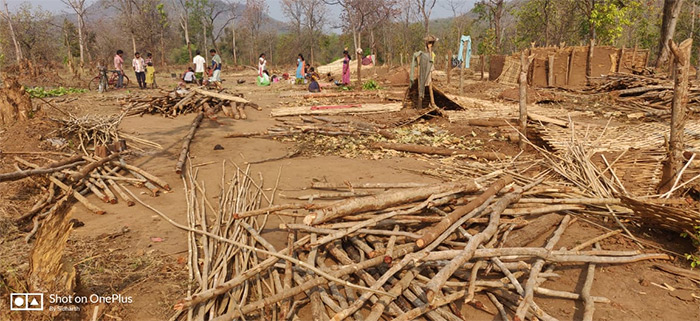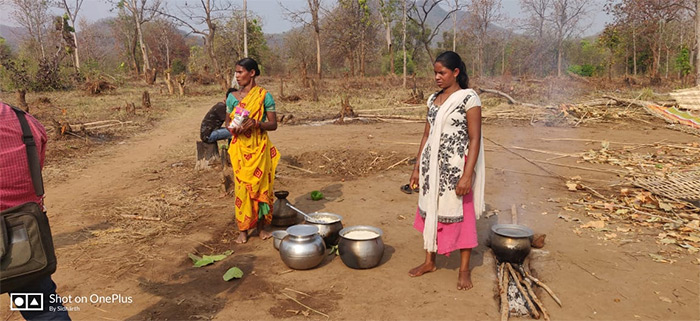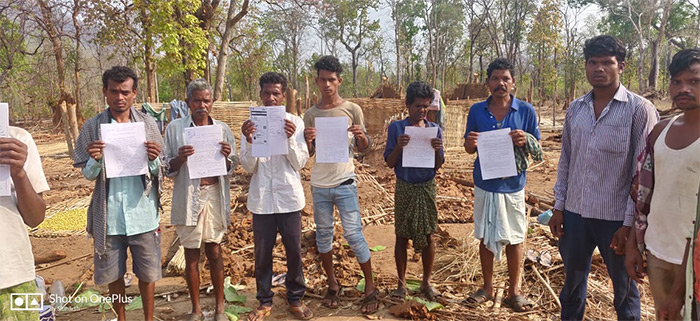Memorandum to the Chief Minister of Odisha on Sagada Forest Evictions in Kalahandi
To
Navin Patnaik
Chief Minister of Odisha, Bhubaneswar
Honourable Sir,
We would like to bring to your notice, the illegal and forced eviction of 32 Adivasi families of Nehela village under Jugsaipatna Panchayat in Kalahandi district by officials of Odisha’s Forest department. On 24th April 2020, at around noon time a team from the Bhawanipatna Southern Forest Range came to Sagada village and forcibly, without prior information, demolished the homes of these 32 Kondh families, pulling down their homes, throwing out their belongings and abusing them for illegally occupying the forest.

The demolition is not only inhuman action during COVID 19 lockdown but also a gross violation of the FRA legal provisions for traditional forest dwellers and a criminal offence amounting to an atrocity under the SC & ST PoA Act.
The Forest officials also assaulted and illegally detained a local advocate Siddharth Nayak who had accompanied a regional journalist team to visit the village and provide legal support to the evicted Adivasi families on next day. This is against the right to do one’s legal profession and right to freedom of expression (in case of the journalists).
The Forest officials told the villagers that they are encroachers as the land on which they had set up their village was classified as reserve forest. But the Nehela villagers have a different claim. The land on which they have set up their current village at Sagada of Panchayat Sagada, after shifting from their ancestral habitat which was further inside Karlapat Sanctuary, is classified as village forest. The forest officials have started telling in the media that the land is classified as ‘Proposed Reserve Forest’ which has no legal meaning.

Cause of the attack: These villagers were original inhabitant of Nehela Panchayat of Jugsaipatna Panchayat of Kalahandi block. The panchayat comes within Karlapat Sanctuary area. The problem of the villagers in these hilly areas started in the year 2017 when heavy landslide due to heavy rain made villagers of two villages, namely Nehela and Makaguda, almost homeless. The rain also washed away their agricultural land, became difficult to reclaim. The villagers explained that they were fearful of their lives as during almost every monsoon torrential rains threatened to wash away their homes as they were living on the edge of a cliff inside the Karlapat Sanctuary. The villagers have been writing to the District Collector and District Forest Officer regarding their demand to provide them with legal land titles to their homestead and farmlands since the last two years. The villagers have a copy of the acknowledgement that they have received from the above government officials. However, all of their requests have gone unheard.
Earlier this year they identified a clear land at Sagada village in Sagada Panchayat nearly 20km far from their original village. After consultation with local villagers, and because of this land also belongs to village forest, they started construction of the village at new place. That became intolerable for the forest department. They demolished the houses. It is listening that a wide road is under construction to link the proposed mining site of Khandualmali with nearby national highway. That road would go through Sagada village where the villagers had constructed their houses.

Background: We are bringing the fact before you that those 32 Kondh adivasis families were living inside the Karlapat Sanctuary since generations and were practicing shifting cultivation for their livelihood. Karlapat Sanctuary has 10 revenue villages and 9 unsurveyed villages with a total population of 1551 as per a 2014 official survey. Besides these 19 villages, there are 44 villages around the sanctuary with about 8000 population. Nehela was one such unsurveyed village and the villagers were entitled to settlement of their forest land and community forest rights under the Scheduled Tribes and Other Traditional Forest Dwellers (Recognition of Forest Rights) Act, 2006 (FRA in short). They are also entitled to several resettlement rights as per the above Act, that is, they cannot be evicted without their legal formal consent and prior notice, selecting their site of relocation as per their suitability, cash compensation, provisions of public utilities in the relocated village, etc.
Earlier, the Forest Department was forcing them to leave the village and the villagers were asking for proper relocation. Instead, the Forest Department was forcing the villagers to leave the sanctuary ‘voluntarily’. But the landslide became a nightmare of the villagers and they decided to leave the village and to settle at new place. When their repeated request before the District Administration went unheard they themselves chose a place at Sagada and had started staying there. After demolition they have been left homeless and are living inside polythene tents without any food or livelihood option particularly at time of summer storms and pre-monsoon downpours. Neither the villagers go back to their original village nor they can settle at new place. They are in the dark now.
According to Sunadhar Majhi, a resident of the village, “for generations we practiced shifting cultivation but now they (Forest Department) say we cannot do it because it is a Sanctuary. How will we survive? After the landslide, we lived in great fear and finally decided to relocate two years ago. Now they are saying we cannot do this. Why? The village was earlier inside the Sanctuary and now we are within the Sanctuary. We are still within the limits of the Panchayat as before. How can they say we don’t have a right to settle here? We are the traditional custodians of this forest and it belongs to us. Moreover, it is not as if we just suddenly decided to do it. For years we have been running from pillar to post, met the Collector, the DFO, etc. How long will we wait for them to fulfill their duties?”
Cause of worry: According to a notification dated 9th August 2019 by the Ministry of Environment, Forest and Climate Change, Karlapat Sanctuary is a unique biodiversity hotspot. The notification says, Karlapat is undulated terrains interspersed with valleys covered with moist peninsular Sal forests, mixed deciduous forests and bamboo brakes. It harbours a variety of herbivorous and carnivorous animals. A number of perennial streams and nallas flow across the area and feed into river Tel, a major tributary of the river Mahanadi. Karlapat boasts of its elephant population and serves as a crucial corridor link, for free mixing with larger population of elephants in Kotagarh Sanctuary in Kandhamal district and Lakhari valley Sanctuary in Gajapati district. This region interspersed with valleys, has supported myriads life forms, including some of the endangered animals like tigers and elephants, leopard, wild boar, giant squirrels, antelopes, small clawed otters, Indian bison, etc listed under the International Union for Conservation of Nature (IUCN) category.
The Khandual bauxite hill range, closer to this Karlapat sanctuary, was in news two years back that your government might hand over the hill range to the Vedanta Company for mining purpose. Keeping aside the Supreme Court guidelines prohibiting any mining activities within 10 km radius from any wildlife habitat your government had approached the Center twice for seeking permission for undertaking bauxite mining at Karlapat reserve to help the Vedanta refinery at Lanjigada from acute shortage of bauxite materials. (Business Line March 12, 2018)
The campaign: The above incidents hold critical significance as Karlapat Sanctuary has been at the centre of several contestation between the traditional forest dwellers, the government and several prospective mining companies eyeing the eight bauxite reserves in the region. The Kondh community call the Karlapat forests home since generations and have been the traditional custodians of the habitat as per their folklores as well as some pre-Independence anthropological accounts. It is an established knowledge that Adivasi communities are the best ecological conservationists and wherever forest conservation efforts have taken them into confidence not only has the forests have regenerated but wildlife has also flourished and the region has regained its natural essence.
In this context, we see the current assault on and eviction of the adivasis as your government’s push to stake claim to Karlapat forest habitat for mining and industrial activity.
Here, we demand the following actions from your government on an urgent basis :
- Government must immediately allow the Nehala villagers to settle at the place they want and provide them with adequate compensation of INR 5 lakhs for rebuilding their homes and reorganizing their village and farm lands for cultivation.
- Further, the forest officials and police personnel involved in this illegal demolition be identified and cases be booked under PoA Act, IPC and all other applicable charges.
- All pending claims of Nehela villagers under FRA be recognized and settled immediately.
We hope that your government will take immediate steps to ensure the following demands respecting the constitutional justice to the traditional custodians of Karlapat habitat in Odisha.
Yours Sincerely,
- Ashish Kothari, Writer, Pune
- Prof Amit Bhaduri, Academician
- Prof. Ram Puniyani, All India Secular Forum
- R. Sreedhar, Environmentalisth, Hyderbad
- John Dayal,New Delhi
- Amit Sengupta, Journalist
- Madhumita Dutta, Writer
- Sudhir Patnaik, Journalist, Bhubaneswar
- Subrat Kumar Sahu, Independent Film Maker, New Delhi
- Xavier Dias, Activist, Jharkhand
- V.S Krishna, Human Rights Forum, AP
- K.P. Sasi, Film Maker, Bangalore
- Bela Bhatia, Researcher, Chhatishgarh
- V. Vasanta Laxmi, Human Rights Forum, Telengana
- Kavita Krishnan, AIPWA
- T. Vijayendra, Environmentalist
- Felix Padel, Anthropologist
- Madhushree Mukherjee, Writer, Germany
- Sharanya Nayak, Activist
- D. Manjit, PUDR, Delhi
- Chanda Asani, Researcher, Rajasthan
- Dr. P.K. Sarkar, Academician
- Theodor Rathgeber, Secretary, Adivasi –Koordination, Germany
- Narendra Mohanty, Campaign against fabricated cases, Odisha
- Deba Ranjan, Ganatantrik Adhikar Surakhya Sangathan, Odisha
Contact email: [email protected]
Photo : Siddhartha Nayak
SIGN UP FOR COUNTERCURRENTS DAILY NEWS LETTER










































